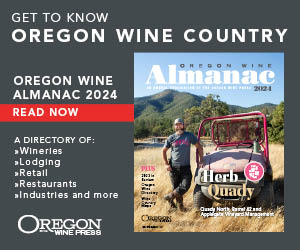Jones Makes Power List
By John Darling
Climatologist Greg Jones of Southern Oregon University has been named to Decanter magazine’s “Power List”—the top 50 most influential people in the world of wine.
At no. 33, he joins the esteemed company of French Premier Nicolas Sarkozy (no. 9), Joseph Gallo (no. 11) and Bollinger Champagne’s Ghislain de Montgolfier (no. 27) on the coveted list.
The list is published in the July issue of Decanter, a British magazine and one of the top three influential magazines in the wine industry, an event Jones called “humbling.” Members of the list are chosen by international wine critics, merchants and people in the industry.
As an SOU environmental science professor for 12 years, Greg Jones—the son of Earl Jones of Abacela in Roseburg—has pioneered the marriage of climatology and viticulture in Oregon and globally, making possible an understanding of the spreading effects of climate change on the wine industry.
When his father planted Abacela Vineyard in 1995, he drew his son, who was engaged in his PhD research at the time, to come and fill a huge need for data on which to predict growing times and varietals that would fit with the state’s many climates.
Jones asked the federal government for new and more specific appellations for Southern Oregon and set up a network of 29 reference vineyards in the region, which are monitored and serve as a fount of data for the industry.
He also contributed to the report of the International Panel on Climate Change, which, along with former Vice President Al Gore, won the 2007 Nobel Peace Prize. The IPCC established the connection between human activity and climate change, which, until then, had been questioned in many quarters.
“I’ve had people say wine studies are superfluous and don’t matter to society,” said Jones. “Al Gore may have popularized global warming but people say it (the predictions of wine’s future in a warmer world) may have greater impact. They bring the topic home and people understand it better.”
Jones conducts applied research for the grape and wine industry in Oregon, has given hundreds of presentations on wine-related research in Oregon and all over the world, and is the author of many journal and magazine articles, with two books in progress.
Harry Peterson-Nedry, owner of Chehalem Winery in Newberg said, “His contributions (to viticulture) are very foundational to our understanding the climate we’re working in. We thought we knew it, but he added a great deal of technical insight and he has an interest in the wine business. That’s driven some of his passion. He’s able to put across difficult concepts.”
Jones built on global warming data to spell out implications for the future of Oregon wines, noted Peterson-Nedry, “and how varietal change is going to have to happen, as well as shifts to higher elevations for growing.”
Dick Ellis, owner of Pebblestone Vineyards, located west of Phoenix, Ore., said Jones’s data on terroir and growing degree days has laid a baseline for grapegrowers, telling them clearly what will grow now and what will grow in warmer times.
“I felt extremely lucky to study something people have great interest in, especially when it’s an important aspect of society and brings in climate change. Very few climatologists were studying this,” said Jones.
Jones’s research and data have helped Southern Oregon wines branch out into a broad array of varietals to match the region’s many micro-climates, but he predicts a winnowing down to under 10 varietals in the coming decade or two.
His global warming research points to a one- to three-degree increase that will greatly exacerbate water supply issues, and “any change beyond that will take us places we’ve never been before.”
John Darling is an Ashland writer.








